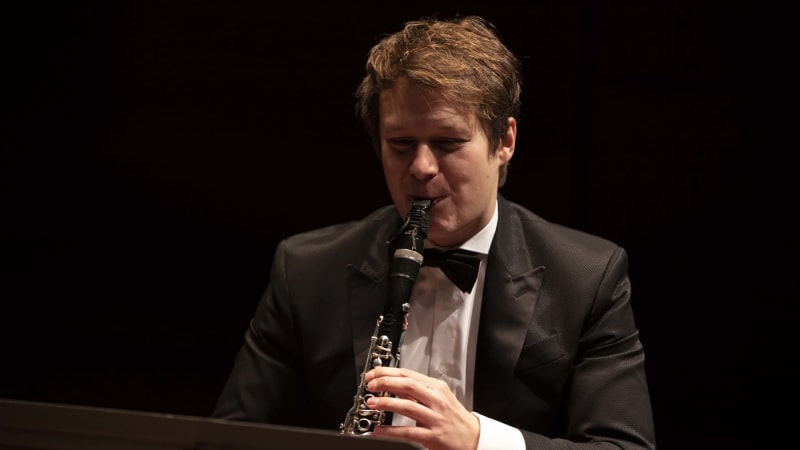Schubert’s “Vocal” Lines
January 9, 2023
By John Sherer
It is often said of Schubert’s work that it is imbued with vocal characteristics—that even his purely instrumental music is full of lines that could have been written for the human voice. Of course, he is one of the most prolific songwriters of all time, having written around 600 songs; on one occasion in 1815 he composed eight in a single day. Yet he is just as well known for his work in the chamber and symphonic genres. By some mysterious process, the spirit of song is present in everything he wrote.
The question may be asked: what does it mean for instrumental music to have a “vocal” quality? How does a musician make an instrument “sing”? We might have a vague sense of what this means, but as with so many questions regarding how we experience music—always a fundamentally subjective phenomenon—it is difficult to describe it precisely in words. Such difficulty may in fact be integral to why music affects us the way it does; if it could be easily explained in a digestible blurb, our engagement with music would likely be less powerful. A satisfactory explanation may elude us, but to quote the late Polish poet Adam Zagajewski, who was writing about something else entirely, “Here we cannot merely content ourselves with our mystic ignorance!”
In an effort to gain a little clarity on these questions, I spoke to two musicians who will be performing in a program called “From Song,” taking place on February 10 and 12, 2023, as part of CMS’s Schubert Festival. Both are wind players (bassoonist Peter Kolkay and clarinetist Sebastian Manz), as it seemed fitting to talk to instrumentalists who, like singers, make music with the breath, about this famed (if ineffable) vocal quality of Schubert’s music. The program this winter includes Schubert’s famous “Gretchen am Spinnrade” for voice and piano, as well as songs with unusual instrumental additions to the standard voice-and-piano pairing: “Auf dem Strom,” which features a horn, and “Der Hirt auf dem Felsen,” which adds a clarinet. The program concludes with Schubert’s massive Octet for winds and strings. Excerpts from our conversations follow.
JS: Peter, can you tell us what it’s like for a bassoon player to play Schubert?
Peter Kolkay: In the Octet in particular, the first thing I’m thinking about is endurance, since it’s one of the longest pieces in the active repertoire. Consider what a singer goes through in the course of an hour to bring the audience through a song cycle. Now take the words away and add instruments, and we have to convey the same sort of journey with no text. It’s not only physically difficult, but it’s also emotionally difficult; you’re conjuring up as many different emotions as you possibly can through sound. It can be a difficult proposition to create a narrative without words over six movements, especially when you’re working with seven other people who also have seven different ideas about what’s going on at a certain moment or what emotions they’re going to call up. There’s a lot of opening your ears to what other people are saying through their instruments (or singing through their instruments), and responding to that in the moment. This is a key element of playing chamber music, and it’s heightened in Schubert.

JS: Sebastian, what is this music like for a clarinet player?
Sebastian Manz: In general, Schubert’s music is full of endless lines and phrases. Robert Schumann described Schubert’s last Symphony in C as having “heavenly lengths” (“himmlische Längen”). As a clarinetist, I have to admit that we often underestimate his music in the demands of its phrasing and in what it takes to sound natural and authentic. Often there might be only a few notes in his lines, but to fill them out with tension, a perfect legato, emotions, and fully controlled breathing is one of the biggest challenges on a wind instrument. And as a former singer in a boys’ choir, I would say that there’s a singing voice behind every single note he wrote. To describe his music, I would say it’s full of emotional, never-ending, almost child-like songs with a “catchy” quality.
When I think about a song like “Der Hirt auf dem Felsen,” I don’t wonder why he chose the clarinet in combination with a singer and piano. On the clarinet we are able not only to recreate every human emotion, but also to experience it, sometimes on a very existential level. We use absolutely the same breathing techniques as a singer; we try to “sing” on the clarinet, and in this song the vocalist and clarinetist have to form and phrase Schubert’s endless lines together, which is really challenging.

JS: How does this “singing” quality influence your approach to the Octet?
SM: When you sing you enjoy every note to the fullest. I take this as my mantra in my approach to music in general. Schubert’s Octet is full of vocal phrases, but at the same time he uses the impressive spectrum of characteristics of winds and strings. He also combines all colors of the instruments to form them into a symphonic sound. I love this kind of metamorphosis. Throughout these changes, you still have to control your breath because of the long lines, especially in the second movement. So you can’t feel too safe—there’s always the possibility of an epic fail! But in the end we enjoy and suffer all together.
PK: I was thinking about what those vocal qualities mean on the bassoon. The bassoon is not a solo instrument in the Schubert Octet, but in Schubert the accompaniments are always just as interesting as the melodic lines. (Think of how much the piano adds in his songs, for example; the singer is never on stage alone.) So I’m thinking a lot about the quality of the accompaniment when I’m playing: how am I supporting the “vocal” line? Am I providing a new emotional color to it? Often with Schubert there’s an undercurrent of longing or of sadness even if it’s in a major key, and the accompaniment often provides that.

JS: Peter, you played the Brandenburg Concertos with CMS in December. Can you describe how you think about the vocal quality of Schubert’s music in contrast to Bach’s music?
PK: In the Brandenburg Concertos, I think about the interplay of different groups of instruments. In that first one, you’ve got the strings vs. the oboes at times; the oboes and the horns and the bassoon make up a unit at times. These groups are in dialogue; you could say they sometimes argue with each other and at other times respond to each other.
In Schubert, I feel like we’re all on the same page—we may respond to one another, but it’s not because we’re argumentative. It’s because we’re taking up the story where the person before us has left it. The ensemble is always working together to tell the story, rather than telling different stories in contrast to each other. As part of an instrumental unit, you have to work together to create that story on the spot, whereas in Bach the story is baked into the music itself.
One thing I’ve noticed about the Brandenburg Concertos: I’ve played them with a number of groups, and they almost always work. No matter who you’ve got there, you know what you’re going to do, you know how you’re going to respond to each other; you can come up with new ways, of course, but a lot of it is already on the page. With the Schubert Octet, if you don’t have the right eight people, it doesn’t work at all. It’s funny—they can be the best eight musicians in the world, the most amazing players, but if they don’t find each other somehow as people, it doesn’t work. When it does, it’s the most incredible experience because you realize how much you connect with the other musicians on stage.
John Sherer is Editorial Manager at the Chamber Music Society of Lincoln Center.





